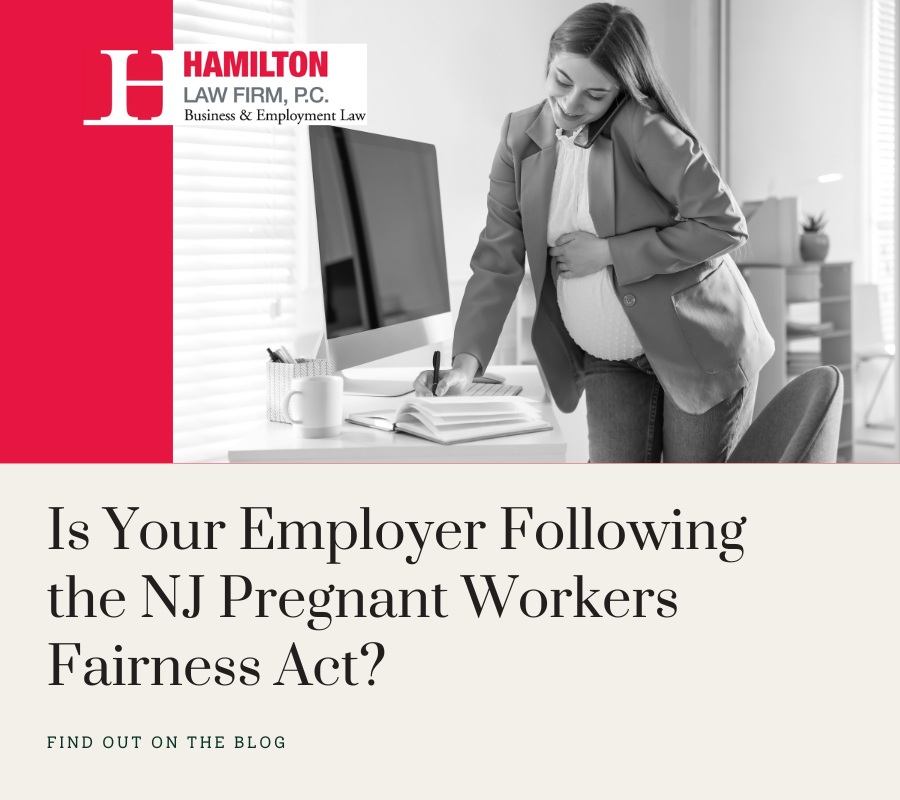All employees are given legal rights under both state and federal law. New Jersey passed the Pregnant Workers Fairness Act to further protect pregnant women in the workplace environment. The law, which extends the protections under the Pregnancy Discrimination Act, requires your employer to follow very specific rules as a pregnant person.
Knowing your rights is critical. If you believe your employer is mistreating you by disregarding the regulations put in place by the NJ Pregnant Workers Fairness Act, contact an employment lawyer in NJ at the Hamilton Law Firm now to discuss your case.
What Are the PWFA Regulations?
The Pregnant Workers Fairness Act NJ went into place in June of 2023, impacting all employers with 15 or more employees. The law reads that employers need to provide reasonable accommodations when there are known limitations related to pregnancy, as well as childbirth and medical conditions. This requirement applies as long as the accommodation does not create undue hardship on the employer.
Improving Limitations on Previous Laws
The Civil Rights Act of 1964 initially put in place some protections for pregnant women, and the Pregnancy Discrimination Act, which amended the Civil Rights Act, offered additional protections. However, these initial laws required that employers provide accommodations to pregnant women in the same way they would a worker with a medical restriction, which applies under the Americans with Disability Acts of 1990.
The new PWFA regulations put in place requirements to ensure that even if a person’s condition does not meet a disability under the Americans with Disabilities Act, it may still be protected.
What Your Employer Cannot Do
The best way to understand what this law means is to consider what employers cannot do. In NJ, pregnant workers are protected in several ways:
- Employers cannot deny equal employment opportunities based on a need to make reasonable accommodations
- They cannot require an employee or an applicant for a job to accept accommodations without going through an actual interactive process
- Employers cannot place pregnant employees on leave, whether or not that leave is paid, if they can make reasonable accommodations instead
- Employers may not take adverse action against a worker who is requesting this type of accommodation
- Employers cannot retaliate in any way against employees who are reporting or otherwise opposing unlawful discrimination under this law
Employers must treat pregnant workers fairly, and to do that, they must provide reasonable accommodations when it is feasible for them to do so.
What Are Reasonable Accommodations?
The law does not outright state what reasonable accommodations are. However, the Equal Employment Opportunity Commission (EEOC) offers some examples of what employers should be able to do to accommodate an employee’s needs due to pregnancy, childbirth, or related medical conditions. Some examples include:
- Providing frequent breaks
- Providing access to telework
- Making schedule changes or offering flexible hours or part-time work
- Make adjustments for sitting and standing requirements
- Placing an employee on light-duty assignments
- Provide a reserved parking for a person
- Offer job restructuring
- Adjust or modify examinations or policies
- Adjust or modify equipment, devices, or uniforms to meet needs
- Temporarily suspend some essential functions of the job
The EEOC has listed some “modest and minor” changes at work for pregnant employees. These are routine pregnancy-related tests that are usually not difficult for employers to provide.
Some of these specific examples include:
- Allowing an employee to take breaks to eat and drink
- Allowing employees to take more frequent restroom breaks
- Enabling an employee to have access to water and rink, as needed, within their work environment
- Providing an opportunity to sit for previous standing work
The NJ Pregnant Workers Fairness Act requires that employees offer these types of accommodations in most situations as long as what the employee is asking for does not cause undue hardship on the company.
Additionally, employers cannot delay in putting these supportive structures into place unnecessarily. That includes providing accommodations whenever it is possible, even if there is a request still pending.
What to Do If Your Employer Isn’t Following PWFA Regulations
Individuals who believe their rights have been violated have the legal right to file a claim with the Department of Justice and the US Equal Employment Opportunity Commission (EEOC.gov). The EEOC will then investigate what occurred and determine what steps may be taken to rectify the situation.
If your rights have been violated and you have been wrongfully discriminated against, it is critical that you take steps to protect yourself. If the abuse does not improve, we highly suggest getting additional help and support, and in that it may become necessary to pursue legal action against that party. You should not lose your job because of pregnancy. If that happens to you, contact us.
Hamilton Law Firm, P.C. is committed to protecting your rights and interests. If you believe your employer is violating the NJ Pregnant Workers Fairness Act, reach out to our legal team for guidance and support.


